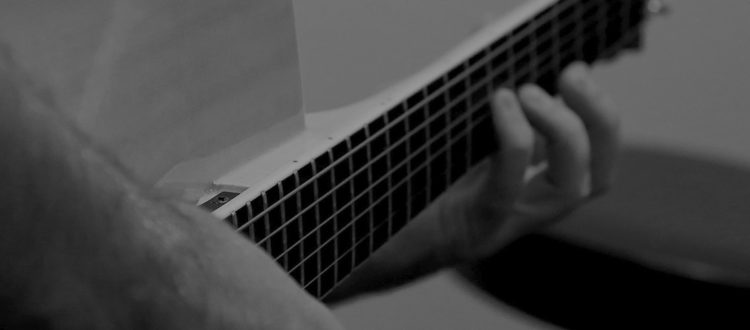By Andrew McNaughton – lecturer at JMI & Qld Conservatorium
When JMI put out the called to arms for a jazz-related blog with an educational aspect, I responded with an enthusiasm borne out of a deep sense of duty and the passion of a dedicated teacher. Ask not what JMI can do for you but what you can do for JMI … wait, am I getting paid for this? As it happens, I have just started learning a new instrument (guitar) and the fact of starting again from scratch has forced me to reconsider the whole process of practicing, the nature of learning generally, and the way in which I learn, specifically: all good, broad blog fodder to get the ball rolling. Following are some meanderings, experiences, questions and tentative conclusions.
Beware the Guru
Everyone knows that starting a new instrument requires many hours of “internet research”. First things first, I had to choose a guitar commensurate with my age, ie old. But should I go with the mid-life crisis sports model or the functional estate wagon? Well, I found the perfect thing – cheap and thin with an unassuming soft case. I can sneak that into the house. My wife will never notice. With that done, it was time to search out a teacher. So, I made my way through a forest of red flags: smiling faces offering guitar world domination, lists of steps to stringed enlightenment, graphs plotting my potential progress, FREE music lessons delivered straight to my inbox, and more TABS than there are grains of sand on all the worlds beaches. I came across two interesting and useful websites:
Jamie Andreas’ http://www.guitarprinciples.com/
http://www.bulletproofmusician.com/practice-hacks/
Jamie’s site contains lots of well thought out and succinctly expressed ideas about learning. In particular, she talks of Intention and Attention. She has managed to express very simply a concept I have intuitively used in my playing and teaching over the years. My version is much more rambly and imprecise but comes under the banner of Play What You Hear and Hear What You Play. It might be noted that you can’t actually play what you hear. Hearing happens physically through your ears so the sound has to exist first. Play What You Hear is really a direction to use your will to conceive an idea of your future self—what might be called visualisation in other spheres, and what we as musicians might call auralisation, perhaps. Then comes the realisation of this idea along with (hopefully) some judgment as to how the actuality matches the thought, and the whole process continues … in theory. Problem is, in theory, theory and practice are the same. In practice, they are not.
Play What You Hear | auralisation | will | Intention
Hear What You Play | realisation | awareness | Attention
In my mind, these are more or less different words to express the same idea, And here’s another one: Buddha! See TL;DR below.
 MINDLESS PRACTICE
MINDLESS PRACTICE
I usually talk and think about this Intention—Attention idea in relation to the mystery of improvisation but it applies equally to private practice, which leads me to the idea of slow practice. I never knew what it meant to practice slowly. I would do it … under duress … with limited results. It was boring … mindless. However, sometimes I would find myself naturally practicing something slowly enough to become aware of what I was doing. And that’s the key IMHO. The real trick for me is to practice slowly enough that I become aware of my actions and their effects … practice slowly enough that so I can hear inside the harmony, perform a physical action accurately or whatever. Slow practice has a great potential to be mindless. Practice slowly enough. This is pretty basic stuff but I was a slow learner.
Another side of this coin is the notion of habituation and attention span. I have this dull feeling of guilt that mutters under its breath that I should have practiced better when I was younger. If I had spent more time practicing scales and arpeggios and ‘proper stuff’ I would be a better musician. I am going through this process again with the guitar. I try to practice the ‘proper stuff’ but get side tracked so easily. I play some melodies/scales for a few minutes then before I know it I am trying to move between two chords I struggle with, then I am attempting a jazz standard, then I have an idea for a new tune based on a mistake I just made (happy accident) and then I realize that I started off trying to play an A min pentatonic. Stay focused McNaughton … A C D E … mmm … which string should I play that on? What finger should I use? Ooh, that’s an interesting sound, I wonder if —SQUIRREL!
But maybe this isn’t so bad after all. Bulletproofmusician.com talks of the 3 minute attention span and how quickly we become habituated and turn off. By letting my attention wander, so to speak, I remain aware, in the moment, focused. I am not practicing mindlessly. Well that’s my story and I’m sticking to it.
TL;DR:
Be aware of what you are doing. Duh.
IDEAS FOR BLOG NAME (my call to arms)
So there you have it, the more or less coherent ramblings ( is that an oxymoron?) of a more-or-less sober jazz musician (another oxymoron? Or just a moron?) In conclusion, I would say that I have no conclusion except to quote the Australia fast-bowler, Brett Lee: “You don’t get any better at something by not doing it” or something along those lines. So, back to the guitar. Only another 9927 hours to go. I can almost play about seven chords, which means I can almost play about 50000 pop tunes.
Signature
Of course, all of this comes with the usual caveats: IMHO, AFAIK and ICBWIBKTH (I could be wrong, it’s been known to happen). YMMV
If you’re interested in learning guitar in Brisbane, JMI offers music classes, courses and lessons to help you get started!
